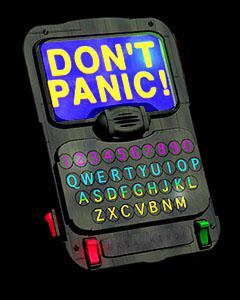I have written this with the Endurance Life UTSW100 in mind but can probably apply to others. It's not a training guide, just a collection of things I've found useful over the years and a shortened version of this general advice thing that I wrote a long time ago and really should get updated.
Mind - DON'T PANIC
I think the first two words to the Hitchhikers Guide to the Galaxy are probably the best ultra running advice you will ever get. This was written with someone thrust into the depths of the universe in mind. You may feel the same. Keep saying it to yourself. 
Don't compare your insides to someone else's outside's. You might toe the start line looking around at all the other runners and think things like "those guys are so much better prepared than I am", "They don't look worried at all". You are wrong. I think everyone feels a bit daunted at the start of a 100 mile race, be it their first or fiftieth. People do a great job of keeping things looking good on the outside while fallilng apart on the inside. Don't stress about everyone else appearing to have it all under control. They are feeling it too.
And don't start comparing training that has been done before. There will be someone here who has run more training miles who will finsih behind you. There will be someone who has run less and will finish ahead of you. What's done is done. I've found that these kind of events are less about what someone puts into the training and more about what they are prepared to do in the next day (or two).
Afraid? Good. You should be. 100 miles over some really tough terrain is a really really tough challenge that is going to take a lot out of you and is going to require all that you have to finish, maybe even more than you think you have. Fear canbe a good thing, it is an emotion that keeps us from getting outselves into bad situations but also overcoming such fear is a thoroughly exhilirating experience. I always like to remember a Mark Twain quote "Courage is resistance to fear, mastery of fear, NOT absence of fear". If you are afraid it means that you are about to do something emotionally significant. Something that you'll never forget or regret.
Matter - Don't ignore early thirst
It's easy to get caught up in the moment at the start, go a little too fast and think "I won't waste time of drinking, I'll get a few miles in first". This is dangerous. Ignoring thirst on a long run is like missing payments on a debt, you can get away with it for a while but then it comes back and hits harder than you can deal with.
Keep drinking, even if it is inconvenient and remember to take electrolytes. Electrolyte depletion feels very similar to exhaustion, jelly legs, spaced out head and feeling of lack of control over your body. It may not be too hot and you might not feel like you need to drink too much but you are going to be sweating at least a little for more than 24 hours. Believe me running 50 miles while dehydrated is not much fun at all.
Matter - How fast should you set out?
Ha ha. How long is a piece of string? Actually best not go there. This is one of the great hitherto unanswered questions in ultra running. With anything up to a marathon it's easy. Take the time you want to do, divide that by 26.2 and that is the pace you should set out. Experienced runners can keep the same pace going for 26 miles however even at the top end of 100 mile running even pacing is rare. Everyone slows down, even in some of the worlds best performances.
This is not a license to set out like a whippet though. You don't want to run yourself into the ground early and have an 80 mile death march. You should run at a pace that isn't lung busting. The hills, the food stops, toilet stops and navigation will mess with your average pace. The point is that no one yet has found this "ideal pace" solution and therefore you should not stress about exactly what it is for you.
Also, I find that I hit the wall at around 16-20 miles in every run I do, whether it's a Marathon or a Spartathlon. It's just that uncomfortable time when your body starts burning it's fat reserves. Nothing to worry about. Remember those first two words.
Mind- Thing big and think small
100 miles is a bloody long way. There, I said it. You already knew this. There are times when it all just feels too big, when the size of the task feels so huge that you end up thinking that you can not do it. When the size of the job feels too big then this is the time to switch to small thinking mode. Think about every step, if you can put one foot in front of the other you are doing fine. Don't think about how many you have to do, just do them, one by one. Think of the next few meters, of every sip of drink, every signpost. All of them are progress. Think small, think boring, think detail.
Sometimes the here and now is too painful, or too dull. You legs hurt, you feel tired or hungry and the present is not a very nice place. Now is the time to flip the switch and think big. Think of the finish, think of the joy and satisfaction of completing a 100 miler, think of the stories you will tell to your friends and family, think of the glow of satisfaction when you lay down to sleep after such an incredible feat. Feels pretty good doesn't it? Well worth the pain right now.
Matter - Dress for the hot and cold
Your body is an incredible machine for disipating heat when you are ht. It is also an incredible maching for holding into heat when it is cold. The problem is that during this race you'll be requiring both and the body might not change modes quick enough. Starting at 7pm it may still be quite warm, you'll be running a bit faster and generating a load of heat. The body then shunts this away. Then when the sun goes down you might slow, the air is cooler yet your body may still be shunting away heat. It will adapt but it's good to be aware in these times and dress and run accordingly.
The key to keeping warm in the cold is layers. Wearing two or three tops gives you extra air between the layers to insulate you. If it's going to be cold then I suggest taking an extra layer. Keep moving if possible, swing your arms to generate more heat if needed. Think about what to put in your drop bag. Perhaps a change of clothes if you get wet early on and a chance of socks.
But then don't forget the Sun. It is going to get light from about 4am and you'll have the best part of about 18 hours exposed to the sunlight. Even if it's not hot you should not underestimate the slow sapping power the Sun has. Protect your head particularly the back of the neck. Even in Britain you can get sun stroke and heat exhaustion. 
Mind - Plan your funeral
OK so you are not actually going to die but this is one of the most effective ways I have ever used of getting away from negative and depressing thoughts. When you've been running for a long time your brain lets in lots of negative and destructive paranoid thoughts. Like your friends mocking you, sneering at your awful efforts to try and finish 100 miles. You'll believe that the whole world is conspiring against you, that every wobbly stile or rusty gate is there to impede you personally. That a loose rock or an exposed tree route has been placed there by some devine for intent of ending your race. This is normal. And funny.
In these times celebrate every little victory you can. Every person who lets you past, every dog that does not bite you, every child that yells "well done" or "keep going". Every time the sun comes out, every time you see a route marker that lets you know you are on the right track. All of these little things help.
And if you really are struggling mentally start planning your own funeral. Imagine a scene when you are in a box about to be buried and everyone close to you in your life is there. Imagine the things that they will say, the ways you touched their lives. It will obviously only be great things they will say. You can be as egotistical as you'd like, no one needs to know. Every word spoken will be about how awesome you are. If they have nothing good to day then don't invite them to your funeral.
Matter - TAKE THE COMPULSORY KIT
I know you might be thinking that the race organisers take some sadistic pleasure in making you carry stuff around and that you can shave a precious 10 seconds off your 100 mile time if you weren't burdened with the crippling weight of some spare batteries. You'll find kits lists like this in events like this all over the world for two very good reasons, your own personal saftey and the saftey of others.
It goes without saying how some of these items can save you if you did get into trouble. Instead think about how the safety of others would be compromised by your own failure to take responsibilty. If the organisers or rescue services are dealing with someone getting hypothermia due to not packing the mandatory clothing it means they are stretched if another incident occurs, such as a bad fall. I've seen this happen and it's often the more experienced runners who take these risks. Don't do it, it's not just your own saftey that you'll be compromising but that of your fellow runners and of the existence of the race.

Mind - Enjoy the suffering
After 24 hours of running, you'll exhausted, you didn't sleep the previous night and you might not sleep tonight. You legs hurt with every step, your feet are on fire. You feel hungry but unable to eat, you may feel cold but burnt. You still have a long way to go and fear not getting there. You mind is tormented with the scenrios of failure. You start asking yourself "What if I don't finish?", "what will people say"? "What the hell am I doing out here?"
Times like this I think of the people back at home, on a Saturday night in their living rooms waiting for a long line of musical wanabees get cut down by a sneering record exec to make good TV. I think about those who don't really know what it's like to be outdoors in the cold and dark wondering what the limits of their physical being are. I think about those who are going to sleep in a nice warm comfy bed to wake up the next morning and have nothing to do and all the time to do it. Perhaps watching more TV, having another breakfast or reading the same old stories in the newpapers. Those who will stay indoors if it's raining. Those who might drive to the gym later but probably won't.
I think about how these people are suffering so much more than I am. They just don't know.
James, Thankyou having just signed up for next years TP100 (crewed last year) it is valuable reading.
cheers
Paul
Great set of tips James! Particularly your last point. Give me the pain and suffering of an ultra over X Factor any day! If I'm ever feeling like crap, I tend to remind myself that nobody is making me do this. I'm out there because I love it!
